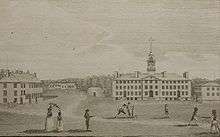Moor's Charity School
| Moor's Charity School | |
|---|---|
 The earliest known image of Dartmouth College, which appeared in the February 1793 issue of Massachusetts Magazine, illustrated a brief article on the college. The artist, Josiah Dunham, a member of the Class of 1789, was a preceptor at Moor's Indian Charity School at the time. | |
| Location | |
|
Lebanon, Connecticut United States | |
| Information | |
| Type | Charity school |
| Established | 1754 |
| Closed | 1770 |
| Enrollment | 49 |
Moor's Charity School was founded in 1754 in Lebanon, Connecticut, by the Puritan Calvinist[1] minister Eleazar Wheelock to provide education for Native Americans who desired to be missionaries to the native tribes.
Eleazar Wheelock became involved in education when Samson Occom, a Mohegan Native American, asked Rev. Wheelock for instruction.[2] The English School with teacher Eleazar Wheelock and just one Native student, Samson Occom, transformed into Moor's Indian Charity School. From 1750 to the early 1770s forty-nine Native American boys and eighteen Native American girls were educated at the school.[3]
Between 1766 and 1768, Occom went on a fundraising tour of Britain to raise money for the school. The fundraising effort was extremely successful, raising 12,000 pounds in donations. Rev. Wheelock took the fundraising money, moved the school's location, and used the money to eventually build Dartmouth School.[1] Controversy existed with this action. Samson Occom charged, "All the money has done is, it has made Doctor's [Wheelock] family very grand in the World." [4]
The school survived for only a fairly short time, as Connecticut was located far from Native American territories on the frontier of the British colonies in North America, and because Wheelock desired to expand the institution to include a school for Europeans. The institution was moved to New Hampshire in 1770, where it was re-established as Dartmouth College.
References
- 1 2 David J. Silverman, Red Brethren: The Brothertown and Stockbridge Indians and the Problem of Race in Early America, Cornell University Press, Ithaca, 2010, p.71
- ↑ To Do Good to My Indian Brethren: The Writings of Joseph Johnson, 1751-1776, ed. Laura J. Murray. University of Massachusetts Press, Amherst, p.50
- ↑ Silverman, p.59
- ↑ Murray, p.51